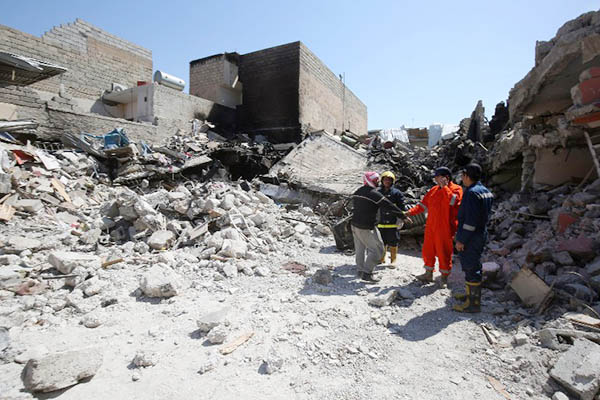
Ahmad al-Rubaye—AFP
Pentagon says review will determine whether airstrikes were responsible for civilian deaths, which continue to rise.
The Pentagon said on Monday it was reviewing more than 700 video feeds of coalition airstrikes on west Mosul, Iraq after reports of a large number of civilians killed in bombings.
Amid rising concern over a jump in civilian casualties in fighting in Iraq and Syria, Colonel J.T. Thomas, a spokesman for the U.S. Central Command, said they were putting a high priority on investigating the Mosul reports.
Nineveh provincial governor Nawfal Hammadi said “more than 130 civilians” were killed in strikes over several days in Mosul’s al-Jadida area, and attention has focused on one allegedly particularly deadly strike on March 17.
U.S. investigators are also looking at the apparent bombing of a school in Mansura near Raqa, Syria on March 21, and a building next to a mosque on March 16 in Al-Jineh, in Aleppo province.
The Syrian Observatory for Human Rights monitoring group said that 33 people were killed in the Mansura bombing and 49 in Al-Jineh, where the U.S. target was a meeting of Al Qaeda officials.
Thomas called examining what happened in west Mosul “the priority at this time” for Central Command. He said the reports of a heavy civilian toll in the northern Iraqi city could represent several days of bombing against the Islamic State group.
“In Mosul, there are multiple days of strikes,” he told journalists in Washington in a Pentagon conference call. “The numbers of civilian casualties that have been reported variously—one of the things we’re looking at is if some of those numbers are cumulative from different incidents, different engagements, in this highly contested, very ferocious battle that’s going on in Mosul.”
Investigators are studying more than 700 video feeds taken during airstrikes on that area of Mosul over a 10-day stretch around March 17, he said. “We know that we were dropping bombs in the immediate vicinity,” he said, noting that the bombs used are “quite precise.”
He also said they were studying “intriguing information about secondary explosions” that news reports suggest could have been sparked by the bombing. “We have not made any specific determinations at this time,” he said, adding that the probe had not risen yet to an official investigation.
Thomas declined to discuss questions raised in U.S. media on whether President Donald Trump’s administration had eased controls on coalition airstrikes against jihadist groups in Syria and Iraq, possibly leading to the surge in civilian deaths.
“With a densely populated area, and the kind of door-to-door, street-to-street fighting, with more bombs being dropped, and there are still thousands of civilians still in western Mosul, that is one of our significant concerns.”
